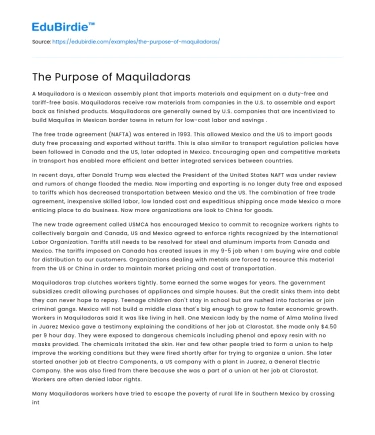A Maquiladora is a Mexican assembly plant that imports materials and equipment on a duty-free and tariff-free basis. Maquiladoras receive raw materials from companies in the U.S. to assemble and export back as finished products. Maquiladoras are generally owned by U.S. companies that are incentivized to build Maquilas in Mexican border towns in return for low-cost labor and savings .
The free trade agreement (NAFTA) was entered in 1993. This allowed Mexico and the US to import goods duty free processing and exported without tariffs. This is also similar to transport regulation policies have been followed in Canada and the US, later adopted in Mexico. Encouraging open and competitive markets in transport has enabled more efficient and better integrated services between countries.
In recent days, after Donald Trump was elected the President of the United States NAFT was under review and rumors of change flooded the media. Now importing and exporting is no longer duty free and exposed to tariffs which has decreased transportation between Mexico and the US. The combination of free trade agreement, inexpensive skilled labor, low landed cost and expeditious shipping once made Mexico a more enticing place to do business. Now more organizations are look to China for goods.
The new trade agreement called USMCA has encouraged Mexico to commit to recognize workers rights to collectively bargain and Canada, US and Mexico agreed to enforce rights recognized by the International Labor Organization. Tariffs still needs to be resolved for steel and aluminum imports from Canada and Mexico. The tariffs imposed on Canada has created issues in my 9-5 job when I am buying wire and cable for distribution to our customers. Organizations dealing with metals are forced to resource this material from the US or China in order to maintain market pricing and cost of transportation.
Maquiladoras trap clutches workers tightly. Some earned the same wages for years. The government subsidizes credit allowing purchases of appliances and simple houses. But the credit sinks them into debt they can never hope to repay. Teenage children don't stay in school but are rushed into factories or join criminal gangs. Mexico will not build a middle class that's big enough to grow to faster economic growth. Workers in Maquiladoras said it was like living in hell. One Mexican lady by the name of Alma Molina lived in Juarez Mexico gave a testimony explaining the conditions of her job at Clarostat. She made only $4.50 per 9 hour day. They were exposed to dangerous chemicals including phenol and epoxy resin with no masks provided. The chemicals irritated the skin. Her and few other people tried to form a union to help improve the working conditions but they were fired shortly after for trying to organize a union. She later started another job at Electro Components, a US company with a plant in Juarez, a General Electric Company. She was also fired from there because she was a part of a union at her job at Clarostat. Workers are often denied labor rights.
Many Maquiladoras workers have tried to escape the poverty of rural life in Southern Mexico by crossing into the USA. President Trump plans to build a wall which make it impossible for them to escape. Today the patrol on the US border has stepped up security to ensure they do not get in which forces the Mexican people right back to Maquiladoras jobs.
Corporation's only priority is profit and this has caused numerous environmental catastrophes such as battery recycling operation in 1993. 6000 tons was left on the top of a hill, when it rained the poisons leaked into their drinking water which caused birth defects, learning disabilities and illnesses.
The working conditions in Maquiladoras is very unhealthy. The way people are treated in these factories is unacceptable. Sacrificing people's health for low wages for company profitability is criminal. These factories need to be regulated and employees be protected and treated fairly. The Mexican people are not making enough money to live properly, the code of ethics needs to be instilled in these factories. Re-organization, regulation and workers rights need to be put in place in order for changes to occur in Mexico.
References:
- https://maquiladoras-educateyourself.weebly.com/
- https://en.wikipedia.org/wiki/Maquiladora#Globalization
- https://socialistworker.org/2011/11/18/misery-of-the-maquiladoras
- https://www.mcclatchydc.com/news/nation-world/world/article24730981.html
- https://books.google.ca/books?id=0I7CASWT9_QC&pg=PT132&lpg=PT132&dq=mexicans+opinion+on+maquilodoras&source=bl&ots=aqUFRXnltO&sig=ACfU3U368xA6OdDzY9oCkk8_PVDTeMykZA&hl=en&sa=X&ved=2ahUKEwjHyZT8nfjgAhVI5YMKHbaVBeoQ6AEwCnoECAEQAQ#v=onepage&q=mexicans%20opinion%20on%20maquilodoras&f=false
- https://www.cnn.com/2018/10/01/politics/nafta-usmca-differences/index.html






 Stuck on your essay?
Stuck on your essay?

